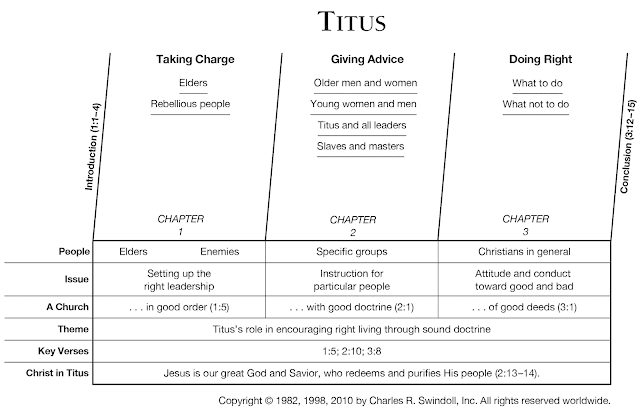Overview of Book Notes
The chronological order of the pastoral epistles is most likely:
1 Timothy abt. 65 AD
Titus abt. 66-67 AD
2 Timothy abt. 67-68 AD (written during Paul's second Roman imprisonment)
Wuest believes these three books to be written closely together in time as they share the same characteristics of style, and he holds that the style of these three are distinct from Paul's writing in the other epistles.
Wuest also argues for two Roman imprisonments for Paul. He believes he lived beyond his first Roman imprisonment and may have been martyred after his second.
In discussing the translation of Greek in this book, he points out that the Greek words often have multiple nuanced meanings and that all of these should be considered when interpreting this book. Me: I wonder if the Amplified makes a point to translate and include these multiple nuanced meanings. My guess is that it does.
Titus was a Gentile Christian leader in the early church. Paul most likely led him to faith and counted him among his most faithful companions. They were together at Antioch before the Jerusalem council of Acts 15. He joined Paul for this council in 49 AD and was his secretary and interpreter. Titus was sent to the Corinthian church twice.
Context of Titus' role and connection to the Corinthians churches from Wikipedia:
"Towards the close of the year 56, Paul, as he himself departed from Asia, sent Titus from Ephesus to Corinth, with full commission to remedy the fallout precipitated by Timothy's delivery of 1 Corinthians and Paul's "Painful Visit", particularly a significant personal offense and challenge to Paul's authority by one unnamed individual. During this journey, Titus served as the courier for what is commonly known as the "Severe Letter", a Pauline missive that has been lost but is referred to in 2 Corinthians.
After success on this mission, Titus journeyed north and met Paul in Macedonia. There the apostle, overjoyed by Titus' success, wrote 2 Corinthians. Titus then returned to Corinth with a larger entourage, carrying 2 Corinthians with him. Paul joined Titus in Corinth later. From Corinth, Paul then sent Titus to organize the collections of alms for the Christians at Jerusalem. Titus was therefore a troubleshooter, peacemaker, administrator, and missionary."
After Paul was released from prison in Rome, they preached at Crete together. Titus may have been a native Cretan.
Paul's letter to Titus details criterion for town-level leaders of the local church, "elders," and contrasts these characteristics with those of "false teachers." It sets forth principles and characteristics of godly behavior for different age groups and genders. The second half of the book examines the interplay between grace and godly behavior.
Concept: "To be a parent of good works." This is from E.W. Bullinger's outline. I find the phrasing interesting...that good works are the children of faith that we are to "parent" and send forth.
Wuest points out that in the Greek language, the nouns "pastors and teachers" are constructed in such a way that the second noun (teachers) is a further elaboration on the first noun (pastors) and not a separate concept. So, being a pastor is to be a teacher. Also, the Greek word for pastor means shepherd, so he should be a shepherd "who always leads his flock, never driving it."
Role of pastor per v 12:
Perfect saints--"perfect" has four different meanings in Greek. The sense of this one is to "equip to do a specific work."
Do the work of the ministry--ministry here means "rendering of service"
To edify the body .
Wuest connects all three of these roles and asserts that a pastor is to be a specialist who perfects saints by equipping them to render service which will edify the body, "instead of being a superintendent of an old people’s rest home, he would be nurturing a beehive of activity." The pastor's role is to nurture the congregation to service.


No comments:
Post a Comment